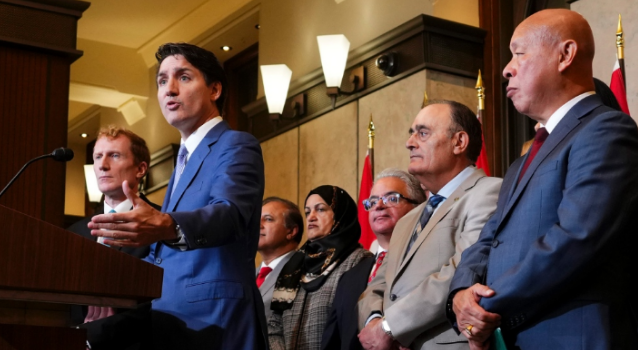B.C. Business Community Reacts to Canada’s New Immigration Targets: Concerns Over Workforce Shortages and Economic Growth
The recent announcement by Canadian Prime Minister Justin Trudeau and Immigration Minister Marc Miller to reduce the number of new permanent residents by 21% in 2024 has sparked widespread concern among British Columbia’s business community. The decision, part of an effort to curb population growth, has drawn criticism from employers and policymakers who rely heavily on immigration to fill critical labor gaps.
Jasroop Gosal, interim spokesperson for the Surrey Board of Trade, expressed disappointment with the government’s sudden policy shift. “Last year, we were told that Canada would welcome 500,000 new permanent residents over the next few years, and businesses prepared for that. Changing this policy so abruptly interferes with their ability to plan for future growth and stability,” Gosal told Global News.
The reduction in immigration comes at a time when businesses in B.C. are already grappling with severe labor shortages. Employers have long voiced concerns about the mismatch between the skills available in the local labor market and those required for the jobs that remain vacant. “This is not the right time for such drastic changes,” Gosal added, emphasizing that many of these positions could be filled by skilled immigrants.
Economic Impact and Investor Confidence at Risk
The immigration cut has also raised fears about its impact on foreign investment and economic stability in the region. “This sends a message to the world that Canada may not have the right policies in place to support business growth, which could deter foreign investors from coming to B.C.,” Gosal warned.
Analysts are concerned that reducing the number of new residents could exacerbate existing workforce challenges, particularly in sectors like technology, healthcare, and manufacturing, which have been experiencing chronic labor shortages. Immigrants often fill these high-demand roles, and a reduction in new arrivals could slow economic growth, limiting the province’s ability to remain competitive on a global scale.
Migrant Rights Groups Raise Concerns
While business leaders are worried about economic growth, migrant rights groups have criticized the government’s move as an attack on vulnerable populations. “The decision to cut permanent resident levels scapegoats immigrants and caters to rising anti-immigrant sentiment,” said Syed Hussan, spokesperson for the Migrant Rights Network. “This will push more migrants into temporary or undocumented status, making them even more susceptible to exploitation.”
Reducing the number of permanent residents will also leave fewer pathways for temporary workers and refugees to secure long-term residency, a point that has been highlighted by human rights organizations and labor advocates. This is especially concerning for workers in essential industries such as agriculture and construction, who have been instrumental in sustaining Canada’s economy during the COVID-19 pandemic.
Labor Market Mismatch and Future Outlook
As Canada’s population continues to age, the need for skilled workers has never been greater. Experts argue that slashing immigration numbers at a time when businesses are struggling to find qualified employees could undermine long-term economic growth. To counter this, Gosal emphasized the need for policies that support both reskilling the current workforce and welcoming new talent through immigration.
“British Columbia must ensure it is creating a conducive environment for businesses to thrive. This includes fostering a favorable tax and regulatory climate that encourages manufacturers and job creators to stay in the region,” Gosal stated.
Despite the government’s decision, many within the business community remain hopeful that federal policymakers will reconsider these immigration cuts or, at the very least, introduce measures to mitigate their impact on the labor market.
Thank you for taking the time to read this article! Your thoughts and feedback are incredibly valuable to me. What do you think about the topics discussed? Please share your insights in the comments section below, as your input helps me create even better content.
If you enjoyed this post and want to stay updated with more informative and engaging articles, don’t forget to hit the subscribe button! I’m committed to bringing you the latest insights and trends, so stay tuned for upcoming posts.
Wishing you a wonderful day ahead, and I look forward to connecting with you in the comments!
